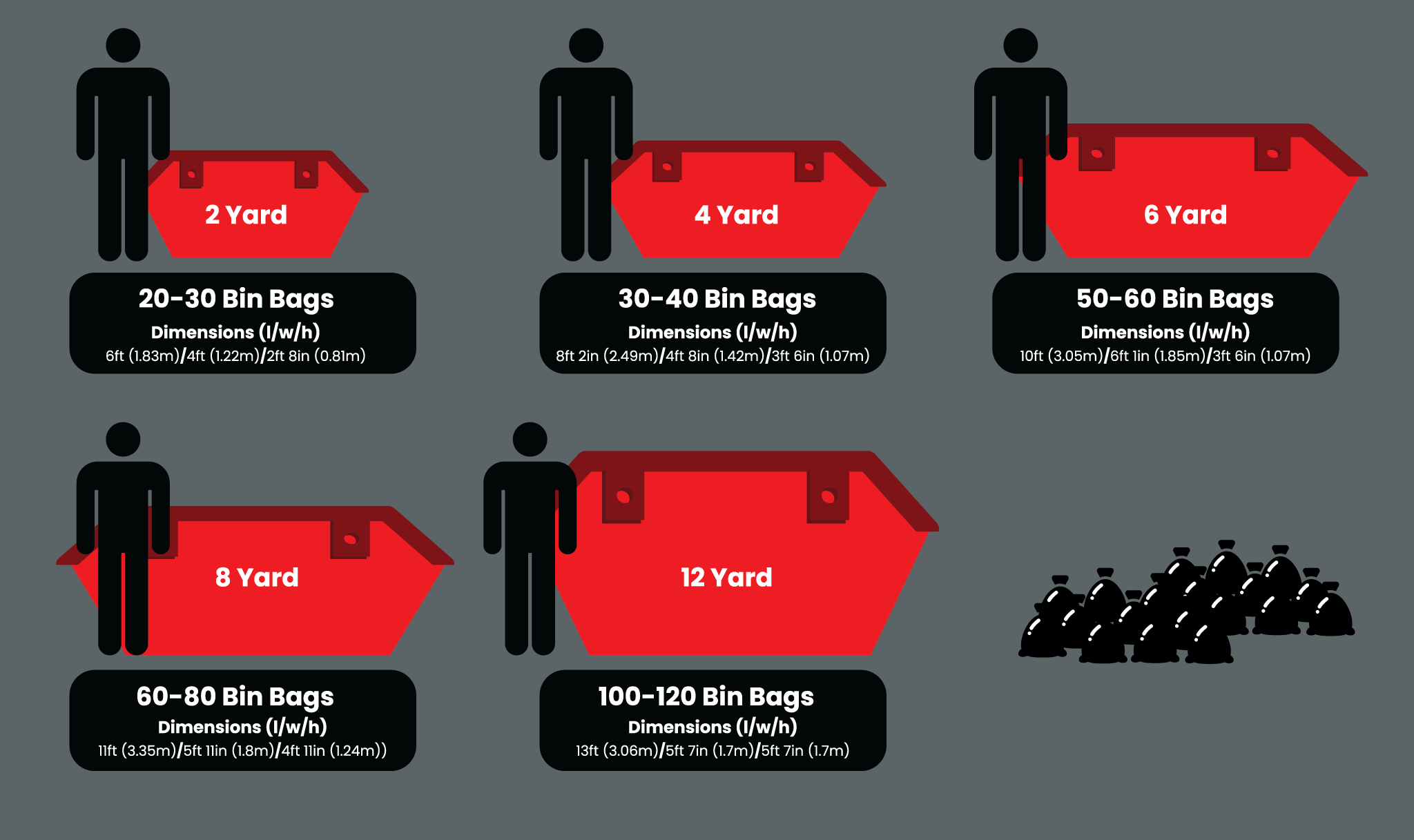Whether you’re renovating your home, clearing out a garage, or undertaking a large construction project, hiring a skip is often the most convenient and cost-effective way to dispose of waste. However, determining the right size skip for your needs can be tricky. Choosing a skip that’s too small might result in multiple hires, while a skip that’s too large will waste space and money.
Understanding Skip Sizes and Capacities
Skip sizes in the UK are generally measured in cubic yards (yd³). A cubic yard is the volume of material that will fit inside a cube measuring one yard (3 feet or 0.9144 metres) on each side. To give some context, a cubic yard is roughly the size of two standard kitchen washing machines. This unit is used to gauge the capacity of skips and helps give a sense of how much waste each skip can hold.
The following are the most common skip sizes available for hire in Cornwall and the UK in general:
Chain Skips
2 Yard Skip – Designed for small amounts of household, garden, or builders’ waste. It can hold approximately 20-30 filled bin bags.
4 Yard Skip – A midi skip (like our 4 yard skip) will hold between 30-40 bin bags, or about 12 wheelie bins worth of waste. It is about the same amount of waste you’d roughly be able to fit in a mall car, such as a mini.
6 Yard Skip – Holds the equivalent of 50-60 bin bags or around 12 wheelie bins worth of waste.
8 Yard Skip – Holds between 60 to 80 large black bin bags of waste, or about 25 wheelie bins’ worth of waste.
12 Yard Skip – Our 12 yard skips can hold about 100-120 bin bags of waste, or large amounts of light bulky waste, such as furniture, plastics, and packaging waste.
The following tables shows the dimensions of our skips, so that you can work out where to put it when you order a skip.
RORO Skips
Roll-on Roll-off skips are typically hired for commercial projects, but can, of course, be hired for domestic purposes. They are hired on an initial flat fee with an additional per ton cost. There is a minimum additional charge for 2 tonnes (5 tonnes if plasterboard), plus any excess tonnage.
17 Yard – Ideal for disposing of waste generated by construction and demolition projects and offers an affordable solution for removing a wide range of materials.
30 Yard – Everything from wood, metal, plasterboard, plastics, glass, cardboard, and paper, through to dry recyclables, window frames, builders waste, industrial and demolition waste, and commercial waste can be stored within this skip.
40 Yard – The size of the 40 yard roll on roll off skip makes it most ideal to dispose of large volume waste, in particular, bulky materials. Our high capacity 40 yard roll on roll off skips are predominantly used by commercial customers working on construction jobs, site clearances, and larger waste volume jobs, with the 40 yard skip being able to hold a maximum of 15 tonnes of material.
40 Yard Enclosed – Enclosed skips can be locked to prevent unwanted spillages or access, it’s the perfect container for making sure those bulky items of waste are stored safely and responsibly.
Estimating Waste Volume
One of the most common challenges is estimating how much waste you’ll produce. A good rule of thumb is to try and visualise how many bin bags your waste would fill. Consider what kind of material you are disposing of, as different materials have different densities. For example, soil, rubble, and concrete are very dense and heavy, while general household waste, wood, and garden waste can take up more space without necessarily being heavier.
DSW Skip Hire will offer guidance on the amount of waste different skips can hold. If you’re unsure, contacting us for advice can help ensure you don’t under- or overestimate your needs.
Choosing the Right Skip Size
1. Small Domestic Projects
If you’re clearing out a small room, tidying up the garden, or tackling minor DIY jobs, a mini skip (2 yard skip) should suffice. This size is also useful if you have a limited amount of space on your property or on the road outside.
2. Medium-Sized Renovations
For more extensive home improvements like kitchen or bathroom refits, a midi skip (4 yard skip) is usually the best choice. This size offers enough capacity for moderate amounts of construction debris and household waste without taking up too much space.
3. Larger Home Renovations and Construction
For larger renovation projects such as re-roofing or knocking down walls, a builder’s skip (8 yard skip) is ideal. It can accommodate substantial amounts of rubble, wood, and metal. Bear in mind that certain materials like soil and hardcore can quickly add weight, and exceeding weight limits can result in additional charges. Be sure to consult with your skip provider, as some skips have restrictions on what materials they can accept.
4. Bulky or Large-Scale Projects
Our larger skips (12 Yard Skip) are the go-to for large household clearances, bulky furniture disposal, and substantial construction work. For particularly heavy materials, you may need a smaller skip to avoid overloading.
5. Commercial and Industrial Projects
For large commercial jobs or major building projects, roll-on roll-off skips (17-40 cubic yards) are designed for bulk disposal. These skips are not suitable for every property due to their size, so be sure to check access and road restrictions beforehand.
Additional Considerations
1. Access and Space
Before deciding on the skip size, consider where it will be placed. Skip lorries need a clear path to drop off and collect the skip. In Cornwall, some areas, particularly in rural or coastal locations, may have restricted access due to narrow roads or uneven terrain, so it’s essential to measure the space and consult with DSW when booking.
2. Permits
If you plan to place the skip on a public road in Cornwall, you will need a permit from the local council. DSW can arrange this for you, but it’s worth checking in advance, as this can influence where your skip is located and there is also a lead time on road permits.
3. Environmental Impact
Cornwall, with its rich natural landscape and coastline, places high importance on sustainable waste management. Be mindful of what you’re disposing of—certain materials like asbestos, electrical goods, and chemicals require special disposal. DSW will provide advice on the proper disposal methods and may offer recycling options, so please let us know what you intend to put in your skip when booking.
Conclusion
Calculating the correct skip size requires careful consideration of your project size, type of waste, and the available space. In Cornwall, where environmental responsibility is key, it’s important to hire a skip from company who adheres to local regulations, such as DSW. By estimating your waste volume, choosing the appropriate skip size, and considering access and permits, you can ensure a smooth and efficient waste disposal process. If in doubt, don’t hesitate to contact DSW Skip Hire for tailored advice.


